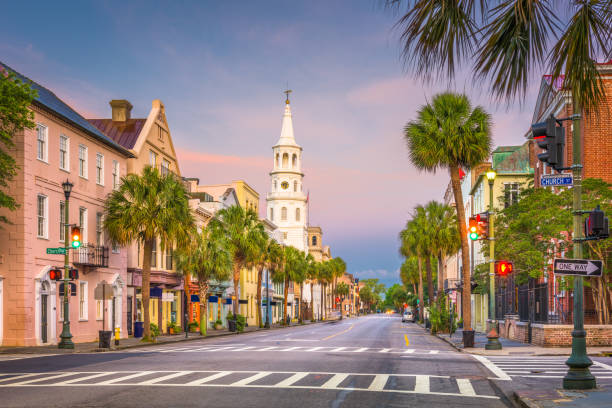



Charleston, the South Carolina port city founded in 1670, is defined by its cobblestone streets, horse-drawn carriages and pastel antebellum houses, particularly in the elegant French Quarter and Battery districts. The Battery promenade and Waterfront Park both overlook Charleston Harbor, while Fort Sumter, a federal stronghold where the first shots of the Civil War rang out, lies across the water. ― Google
March to May and September to November are ideal.
Spring (March–May): Blooming gardens, pleasant weather (60s–70s °F), and popular festivals like Spoleto Festival USA.
Fall (September–November): Mild temperatures, fewer crowds, and beautiful coastal scenery.
Avoid: Peak summer (June–August) can be hot, humid, and crowded; hurricane season runs June–November.
By Air:
Charleston International Airport (CHS) – 12 miles northwest of downtown, served by major airlines like Delta, American, United, Southwest.
By Car:
Easily accessible via I-26 (from Columbia) and US-17 (from Savannah or Myrtle Beach).
By Train:
Amtrak’s Silver Service stops at Charleston Station (about 8 miles from the city center).
By Bus:
Greyhound and Megabus offer routes into Charleston.
Historic Downtown Charleston – Cobblestone streets, pastel-colored houses, and 18th-century architecture.
The Battery & White Point Garden – Waterfront promenade with antebellum mansions and cannons.
Charleston City Market – Historic market with local crafts, food, and Gullah sweetgrass baskets.
Rainbow Row – Iconic stretch of 13 colorful historic houses.
Fort Sumter National Monument – Site of the Civil War's first shots; accessible by ferry.
Boone Hall Plantation – One of America’s oldest working plantations with historic tours.
King Street – Premier shopping, dining, and nightlife district.
Charleston Waterfront Park – Famous for its pineapple fountain and scenic harbor views.
Angel Oak Tree – 400–500-year-old Southern live oak tree on Johns Island.
Charleston Museum – America’s first museum, founded in 1773.
Walking Tours – Try a historic walking tour, ghost tour, or Gullah heritage tour to explore Charleston’s unique history and culture.
Carriage Ride – Enjoy a classic horse-drawn carriage ride through the historic district.
Beach Day – Visit Folly Beach, Isle of Palms, or Sullivan’s Island for sun and surf.
Harbor Cruise – Take a sunset cruise, dolphin-watching tour, or historical boat tour around Charleston Harbor.
Kayaking & Paddleboarding – Explore Lowcountry marshes and spot wildlife.
Visit Plantations – Tour Magnolia Plantation, Middleton Place, or Boone Hall for lush gardens and house museums.
Shop on King Street – Boutiques, antiques, and trendy shops.
Art & Museums – Visit The Gibbes Museum of Art or Charleston Museum.
Attend a Festival – Consider events like the Spoleto Festival USA (spring), MOJA Arts Festival (fall), or Charleston Wine + Food Festival (March).
Sunset at Waterfront Park – Relax with views of Charleston Harbor.
Luxury:
The Spectator Hotel – Art Deco–inspired boutique hotel.
Wentworth Mansion – Historic mansion with Southern charm.
Mid-range:
Francis Marion Hotel – Classic hotel in a central location.
The Restoration – Stylish suites near King Street.
Budget-friendly:
NotSo Hostel – Cozy and friendly with dorms and private rooms.
Comfort Inn Downtown – Good value with basic amenities.
Beach Resorts (for coastal stay):
Wild Dunes Resort (Isle of Palms)
Tides Folly Beach (Folly Beach)
Charleston is a culinary hotspot, especially known for Lowcountry cuisine:
Must-try Local Dishes:
Shrimp & Grits
She-crab soup
Fried green tomatoes
Oyster roast
Hoppin’ John
Top Restaurants:
Husk – Inventive Southern cuisine in a historic house.
Fig – Seasonal, elevated dishes with local ingredients.
Leon’s Oyster Shop – Fried chicken, oysters, and rosé.
Poogan’s Porch – Classic Charleston fare in a Victorian house.
Callie’s Hot Little Biscuit – Famous for handmade Southern biscuits.
Casual Eats & Local Favorites:
Fleet Landing – Seafood with waterfront views.
Rodney Scott’s BBQ – Whole-hog barbecue done right.
Home Team BBQ – Southern BBQ and live music.
Southern Charm & Hospitality – Friendly locals, genteel manners, and warm welcomes are a big part of the Charleston experience.
Gullah-Geechee Heritage – The African-American Gullah people have preserved a distinct culture, language, and culinary tradition.
Historic Preservation – The city prioritizes maintaining its colonial and antebellum architecture and culture.
Arts Scene – Strong performing arts presence (e.g., Spoleto Festival), galleries, and live music.
Religion & Architecture – Known as the “Holy City” for its many historic churches and steeples.
Traditions – Sweetgrass basket weaving, gospel singing, and storytelling are cultural cornerstones.